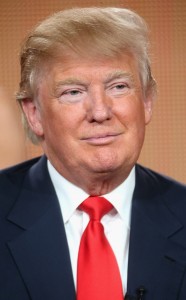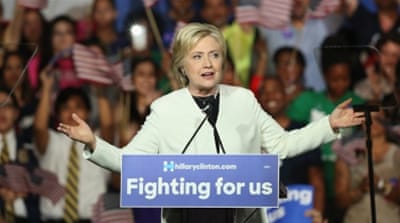
Donald Trump and Hillary Clinton are likely to be in a face-off in November 2016 if the results of the Super Tuesday primary elections offer any indication. Both candidates scored decisive victories, accumulated delegates and solidified their respective frontrunner status.
Trump triumphed in seven of the 10 states the Republicans contested, making a strong case that his insurgent campaign may also be inexorable. The property mogul swept to victory in every state but Texas, the home of Senator Ted Cruz, Oklahoma and Minnesota. The first two were won by Cruz; the third became the only state so far won by Florida Senator Marco Rubio.
While Trump lost two states to Cruz, his other victories in southern states hit directly at Cruz’s supposed strength among the evangelical Christians and social conservatives who dominate the region.
Meanwhile, Hillary Clinton rolled through those southern states, winning the delegate-rich states of Georgia, Tennessee, Alabama and Virginia, as well as Arkansas, Texas and Massachusetts.
Her rival, Vermont Senator Bernie Sanders won his home state and beat Clinton in Oklahoma, Minnesota and Colorado. However, the democratic socialist failed to expand his appeal beyond a narrow, white electorate.
On the road to his electoral conquest, Trump steamrolled a recent controversy concerning his reluctance to disavow support from David Duke, a former Ku Klux Klan leader, although Cruz and Rubio had strongly condemned him for it. Rubio even said it made him unelectable. A CNN opinion poll of Republicans released on Monday found that Trump was the choice of 49 percent – more than all his opponents combined.
Playing on Trump’s turf
The term, Super Tuesday, refers to the day during the presidential primary process when the most states hold nominating contests and this year it was March 1. The logistics are a bit confusing, but 10 states (Georgia, Tennessee, Alabama, Virginia, Arkansas, Texas, Massachusetts, Oklahoma, Minnesota and Vermont) held contests for both Republicans and Democrats. In Alaska, Republicans caucused, as did Democrats in Colorado. Democrats in American Samoa also voted.
Delegates were the major targets and 661 were at stake for the Republican candidates, who need 1,237 to clinch the nomination. The Democratic candidates need 2,383 to secure theirs and 865 were available yesterday. Trump pulled 236 and Clinton won 334.
READ MORE: What’s behind the rise of Donald Trump?
Trump’s Super Tuesday success provides him with a delegate lead that will be increasingly difficult for his rivals to overcome. It also adds more leverage for Rubio, who has a single primary victory, to drop out of the race to enable an anti-Trump effort to consolidate around Cruz.
Rubio and Cruz share many similarities as freshman senators and progeny of Cuban immigrants. They also share a desperation to derail the rollicking Trump bandwagon. Both have begun returning Trump’s ad hominem taunts after once ignoring his tactics as inappropriate for a presidential campaign. Although analysts question the value of playing on Trump’s turf, voters seem attracted to those tactics.
The candidates polling the lowest, Ohio governor John Kasich and retired neurosurgeon Ben Carson, performed mostly according to expectations, although Kasich gave Trump a scare in Vermont. The governor and former congress member is likely to hang on until the March 15 primary in his home state of Ohio. Carson may soon be gone.
Following Trump’s wins the other candidates will lick their wounds and proceed to the next contest. Cruz, who demonstrated some regional strength by winning Texas and neighbouring Oklahoma, issued yet another call for others to stand down. “I ask you to prayerfully consider our coming together, united,” Cruz said.
But Rubio vowed to continue to “unmask the true nature of the frontrunner in this race”. The Florida senator’s recent decision to respond in kind to Trump’s name calling has energised his campaign.
Is the Republican party on the verge of fracture?
The stakes of this challenge are high for a Republican party on the verge of fracture. Already, Nebraska Senator Bob Sasse has announced that he will refuse to vote for Trump if he is the candidate.
Christie Todd Whitman, a former Republican governor of New Jersey, said that if Trump were the nominee she would vote for Democrat Hillary Clinton.
Even Paul Ryan, the Republican Speaker of the House, spoke out against Trump’s flirt with Duke.
Trump’s populist insurgency is a serious challenge to the Republican status quo.
The ultimate power of a political party establishment rests with its capacity for electoral mobilisation. But Trump’s political confection of nationalism and nativism has mobilised the Republican electorate in ways that make that establishment irrelevant.
The establishment understands Trump’s threat and is fighting back after months of assuming his appeal would fade.
Is Sanders tone-deaf to African Americans?
 |
| Democratic presidential candidate Hillary Clinton speaks on Super Tuesday [Alexander Tamargo/Getty Images] |
Meanwhile, the Democrats’ focus on matters of race was the mirror image of the Republicans’ white supremacist deflections.
Both Clinton and Sanders spoke much more explicitly to issues of interest to the crucial black electorate.
Bernie Sanders lost the Super Tuesday black vote to Hillary Clinton by a margin of 83 to 16, according to an exit poll analysis by NBC News.
This gap is reminiscent of the electoral blow delivered by Clinton in South Carolina, where Sanders lost the black vote by an 86 to 14 percent margin on the way to a decisive defeat.
Patrick Murray, a poster for the respected Monmouth University poll, had it right when he told Politico: “All the polling is indicating that the rest of the south is probably going to look like South Carolina.”
That is not surprising to Sanders’ operatives, who knew the campaign would have difficulties pulling African American voters away from Clinton, a well-known and well-liked figure in black communities of the south.
But, according to one critic, the Sanders campaign compounded that difficulty with an outreach strategy that was tone-death to the nuances of South Carolina’s black community.
“It’s been a tour of colleges, a tour of black colleges, a tour of state colleges, but never any penetration into the black community, not even being able to go a block away from those colleges to actually go out into the community,” activist and authorKevin Alexander Gray told Amy Goodman of the Democracy Now television show.
The Sanders dilemma
Clinton, on the other hand, visited black churches and arranged numerous photo opportunities with black women, the vast majority of the black electorate.
The former secretary of state has also tightly embraced President Barack Obama and become more fulsome in praise of his policies. Clinton’s efforts to exploit the black electorate’s extraordinary fealty to Obama have been successfully translated into votes.
One of the more profound ironies of this Democratic campaign is the Sanders dilemma. His policy platforms are the most attentive to the social needs of the black community, but his electoral prospects improve the whiter the electorate.
Sanders’ supporters insist that African Americans will “feel-the-Bern” once he is better known – and he has raised enough cash to extend the campaign – but, as Super Tuesday demonstrated, money won’t buy you love.
END

Be the first to comment